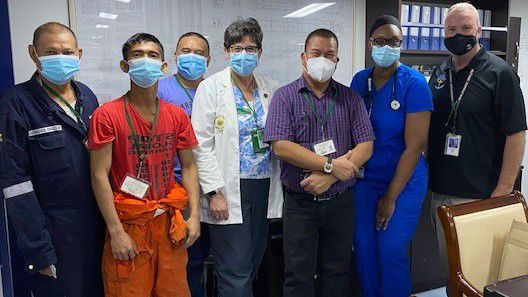Port Tampa Bay and the University of South Florida College of Nursing have partnered on a project to bring a primary care clinic to the port — the first of its kind in the U.S.
What You Need To Know
- USF College of Nursing and Port Tampa Bay are partnering on a health clinic for seafarers
- College says clinic will be the first of its kind at a U.S. port
- It will be located in the port's seafarer center and could be operational in a year or year and a half
- Clinic will offer primary and urgent care
"There is not a primary care clinic, or an urgent care clinic on a port premises in the country," said USF College of Nursing Senior Associate Dean for Academic Affairs & Educational Innovation Dr. Tracey Taylor. "It was very shocking to me, and, in fact, very surprising because I understand how large support is, how much industry is here."
Taylor said the port and college have collaborated in the past, and this was a way the school felt nurses could make a difference. The project was awarded a $35,000 internal grant funded by alumni. That will be used to begin a phased-in approach to get the clinic up and running. According to Taylor, the recently completed first phase involved a year of assessment that included back-to-work webinar and infection control efforts. She said Phase 2 is just beginning and will involve health fairs and ship outreach. On June 30, nursing school faculty and staff boarded ships to provide about two dozen COVID-19 vaccinations to crew members.

"We talked to one of the captains on one of the ships, and he was telling us how he's been on a voyage for almost eight months at this point," said Chaquera Kent, a student in her final semester of the nursing school's doctoral program. "Finally getting his men to get vaccinated has been such a weight lifted off his shoulders."
"We have vaccinated men that didn't have visas that couldn't get off the ship," said Denise Maguire, the college of nursing's senior associate dean of alumni, community, and global engagement. "What they have said to us, specifically the captains, is that they were desperate to get their men vaccinated and that they were thrilled that their men wanted to be vaccinated, but they just didn't have any access for it."
"Vaccines are the main concern, but it's so much more than that for health care for seafarers," said Eric White, an inspector with the International Transport Workers' Federation.
White said it's hard to tell what kind of demand the clinic could see once it's fully operational because there's no comparable service out there. He said securing health care while working on a cargo ship for weeks or months at a time is definitely a challenge.
This empty space in the center will be the clinic’s home once it’s fully operational. Dr. Tracey Taylor, senior associate dean of academic affairs and educational innovation with the college of nursing, tells me it will be the only clinic of its kind at a #US port. @BN9 pic.twitter.com/WFJL8QLoMt
— Sarah Blazonis (@SarahBlazonis) July 1, 2021
"A great example we have, I guess was the end of last year, maybe it was early this year. we had a case of tuberculosis on a ship," White said. "It was a ship that calls Houston, Mobile, then to Tampa. So, the affected seafarer went to the hospital in Houston. With all the vessels' schedules and everything else, they couldn't actually screen the rest of the crew until they got to Tampa. So, they went probably a week without being able to screen the rest of the crew for tuberculosis."
Thousands of seafarers from all around the world pass through Port Tampa Bay each year. Taylor said another goal is to be able to continue to follow up with them, even once they leave land, through telehealth.
"The ships are now outfitted, most of them have the capability to do telehealth," said Taylor. "We still have to, again, work out the logistics for that because there are international waters and things that we have to make sure that we are appropriately handling, and we absolutely would do that. But the hope is, and the vision is, that would be a large part of the model, that we can offer those services."
Taylor said more funding is needed and it will likely be a year or more before the clinic is fully operational, but the hope is that it will serve as a model for ports around the country and worldwide.









